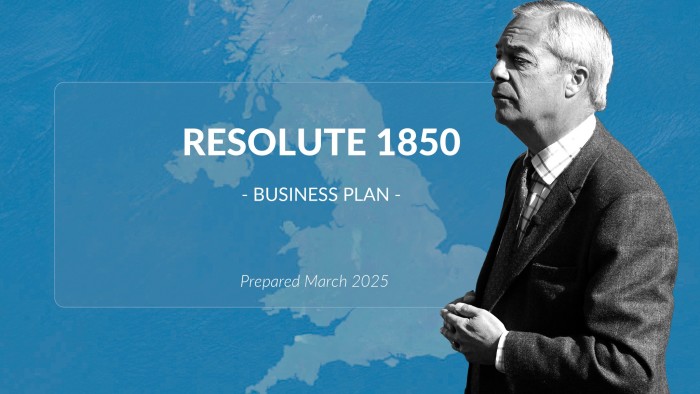Unlock the Editor’s Digest for free
Roula Khalaf, Editor of the FT, selects her favourite stories in this weekly newsletter.
A think-tank affiliated with Reform UK has been pledged more than £1mn in funding and has begun hiring staff, according to people briefed on its activities, as donors and supporters seek to strengthen the policy platform of Nigel Farage’s right-wing populist party.
The developments around Resolute 1850 come after the Financial Times reported last month that senior figures around Reform had drawn up plans for a think-tank modelled on US party-affiliated research groups.
The Center for Renewing America and the America First Policy Institute, for example, are independently funded but openly support President Donald Trump.
A presentation setting out plans for the think-tank said it would “support Reform with policy development, briefing and rebuttal”, with the aim of changing “opinion around key issues and provide technocratic competence”.
It would ultimately “expand to be at the centre of a sympathetic ecosystem with an annual, Davos-like event”, the presentation added.
However, the think-tank’s chief executive Jonathan Brown told the Financial Times that it aimed to have multiple clients. “We are not simply a Reform think-tank,” he said. “It doesn’t matter whether the cat is black or white so long as it catches mice”.
Brown declined to comment on the more than £1mn pledged but said Resolute 1850 had started recruiting, and had office space in Millbank Tower.
The building in Westminster is home to Reform’s headquarters, having previously hosted Tory HQ and being the base for Labour before its 1997 landslide.
The think-tank’s name refers to a Royal Navy ship, the Resolute, whose timbers were used to make the US president’s desk in the Oval Office. Brown said the name would probably be changed soon.
The launch comes as Reform seeks to professionalise and capitalise on opinion polling performance that puts it level with the Labour party and ahead of the Conservatives.
Reform hopes to make significant gains in local elections in England next month, but senior figures believe it will need to sharpen policy offerings if it is to perform well in the next general election, which must be held by 2029.
Filings for the think-tank at Companies House, the corporate registry, list three directors: Brown, Reform’s former chief operating officer, is chief executive; David Lilley, a metals trader who donated more than £250,000 to the party last year, is a director; as is Mark Thompson, an investor with interests in metals and fossil fuels.
Both Thompson and Lilley also have investments in renewable energy companies, according to separate Companies House filings. Reform has pledged to tax renewable energy companies to recoup money the groups receive through government subsidies.
Thompson is a director of Godolphin Exploration, a mining company that says it produces “metals for the green energy transition”, while Lilley is an investor in AltPower Ltd, a hydropower company in Scotland.
Thompson and Lilley did not respond to requests for comment
Brown added: “We’ve had a huge amount of interest from the political and business community because of the state of the country.”
Resolute 1850 “is committed to providing actionable, high-quality policy research and recommendations that shape public discourse and inform decision-making in the UK”, according to a skeleton website for the group that went live in recent days.
It adds: “Our mission is to foster stronger transatlantic relationships and more effective governance, driving positive change through data-driven insights.”

Mohamed Amersi, a former donor to the Tories under Boris Johnson, who fell out with the then Tory party chair, told the FT he had been involved in talks about forming the think-tank, but that he thought it should have only Reform as a client.
The presentation laid out ambitions for Reform to secure multiple donors, including from the Make America Great Movement in the US and from religious conservatives.
It noted that the party’s “positions need more research, stress testing and amendment” and “the party will also need a view on how it reconciles the Thatcherite instincts of much of its leadership with the statist attitudes of many of its voters”.
It also posited “countering housebuilding” as the first issue-based campaign the think-tank could run in 2026.
Brown said this element was misleading. “We are not against housebuilding at all,” he said, adding that the line referred to concerns that Labour would accelerate new-home projects in marginal seats in a bid to influence the outcome of the next election.
The intention was “not to simply import the American model without adaptation to the UK” but to learn lessons from across the Atlantic, Brown said. “The idea we are some British Maga is not true,” he added.




